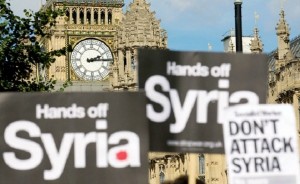 In sum, reduced military capacity, public opposition, the widening of decision making to the legislature and the emphasis on international law and high standards of evidence have all combined to stop Britain intervening in Syria. Jamie Gaskarth argues that if these processes continue and harden, then it is difficult to see the UK being able to act out the great power role of ‘global policeman’ in the future.
In sum, reduced military capacity, public opposition, the widening of decision making to the legislature and the emphasis on international law and high standards of evidence have all combined to stop Britain intervening in Syria. Jamie Gaskarth argues that if these processes continue and harden, then it is difficult to see the UK being able to act out the great power role of ‘global policeman’ in the future.
Has Britain finally given up its global role? It certainly seemed that way when Parliament rejected both motions calling for action in Syria on 29 August. The idea that Britain wouldn’t play a part in an international military effort, led by the United States, to punish the alleged use of chemical weapons provoked an emotional response. Paddy Ashdown tweeted “We are a hugely diminished country this am” and later asked “Why do we need Armed Forces anymore?”. George Osborne acknowledged that a debate on the UK’s role in the world was coming and argued “I hope that Britain remains a country that cares about the world around it [and] doesn’t turn its back on the world’s problems”.
As the dust settled and polls came in showing public opposition to British involvement in the use of force, the Labour leadership’s position hardened from supporting strikes, if proper procedures were followed, to opposing them unless they were in the national security interest. Meanwhile, the government has ruled out putting another similar vote to Parliament, even if the evidence of the Assad regime’s guilt becomes irrefutable.
 One curious thing about these debates is the lack of recognition of Britain’s diminished military capability. Critics of military action expressed fears that it could escalate and result in ‘boots on the ground’ and an Iraq or Afghanistan-style operation to topple the regime. In reality, the 2010 Strategic Defence and Security Review reduced the UK’s capacity to intervene to a Brigade-sized force. That means that Britain couldn’t conduct an Iraq-sized operation (46,000 troops at its peak in 2003) even if it wanted to. Any British involvement would be purely symbolic, in a plan envisaging only limited strikes.
One curious thing about these debates is the lack of recognition of Britain’s diminished military capability. Critics of military action expressed fears that it could escalate and result in ‘boots on the ground’ and an Iraq or Afghanistan-style operation to topple the regime. In reality, the 2010 Strategic Defence and Security Review reduced the UK’s capacity to intervene to a Brigade-sized force. That means that Britain couldn’t conduct an Iraq-sized operation (46,000 troops at its peak in 2003) even if it wanted to. Any British involvement would be purely symbolic, in a plan envisaging only limited strikes.
It is also strange that observers were surprised at the outcome of the vote. British public opinion has been sceptical of the use of force in ‘wars of choice’ for some time. Although there was a brief ‘rally round the flag’ effect when it came to action in Iraq in 1998 and 2003 and Kosovo in 1999, polls routinely noted a majority against seeing these as worth the risk of British casualties. In a 2010 Chatham House poll, the public expressed the desire for Britain to remain a great power with substantial armed forces but also favoured a foreign policy that pursued Britain’s national interest over one based on “ethical considerations”.
Lacking the capacity, and the desire to act, Britain is retreating from its role as an interventionist power. Two further developments are feeding this process. One is the democratization of war powers; the other, the juridification of foreign policy decision making.
Liberals and radicals have long represented war as caused by elites, acting in their special interest away from the public’s gaze. Hiding behind the royal prerogative and ‘national security’, governments could take their country to war without the public knowing the full reasoning behind military action. In the digital information age, the public is now aware that threats to national security are few and far between. Defence strategy documents routinely note that the UK faces no existential threat from another state. Terrorism is a threat but casualties, 9/11 aside, have been low.
To gain support for action against Iraq in 2003, Tony Blair granted Parliament a vote, transforming the relationship between the executive and the legislature. At the same time, the decision to go to war became a collective and democratic one. In an era of austerity at home, public scepticism of foreign adventures has fed into parliamentary opposition to government action.
The basis for war has also increasingly become juridified. It is not just that policymakers routinely make reference to international law – a virtual, aspirational thing in many respects given its contested nature and fragmented practice. But the public and parliamentarians now demand ‘evidence’ to support action. The legacy of the Iraq debate and the way intelligence was portrayed as facts is that governments are now pressured to release the full intelligence picture as evidence that their assertions are correct. This is a misunderstanding of intelligence. In reality, intelligence is not facts but a mix of information, gossip, conjecture and human actions that need to be interpreted. It is not like evidence in a court case.
Moreover, the emphasis on governmental information being superior to that of the public is out of touch with the modern world. As the US intelligence assessment notes, thousands of social media reports were produced on this attack from at least 12 different locations in the Damascus area. Hundreds of videos were produced within hours documenting the results. Experts noted that the sheer scale of the attack ruled out rebel involvement. The ‘evidence’ was everywhere. That the public and parliamentarians still clamour for more is an indication of the high bar they are setting to justify action and the lack of trust they hold in their governments.
In sum, reduced military capacity, public opposition, the widening of decision making to the legislature and the emphasis on international law and high standards of evidence have all combined to stop Britain intervening in Syria. If these processes continue and harden, then it is difficult to see the UK being able to act out the great power role of ‘global policeman’ in the future.
Not everyone sees this change as fundamental. Boris Johnson has emphasised “the continuing cultural, political, commercial and intellectual influence of this country” and even gamely tried to portray Obama putting the use of force to the vote in Congress as a “victory” for Cameron. Daniel Hannan sees the UK as standing “taller in the world” because it has showed some independence from the United States. It is also, after all, only two years since the Libya operation. Nevertheless, the UK has taken a big step in removing itself from its recent role as interventionist power and reliable ally of the United States. It may find it rather prefers to inhabit the alternative role it now finds itself in, as a less bellicose and more introverted country.
There is a further possibility: that the US and France could both vote against intervention. This would make the UK seem less isolated in its stance. But, for those of us who would want the international community to uphold the prohibition on chemical weapons use, a norm that predates the League of Nations, let alone the United Nations and the Security Council, that would offer little comfort.
This article was originally published on the PSA’s Politics Insight blog.
Note: This article gives the views of the author, and not the position of the British Politics and Policy blog, nor of the London School of Economics. Please read our comments policy before posting.
Jamie Gaskarth is Deputy Director of the School of Government, Plymouth University. His book British Foreign Policy: Crises, Conflicts and Future Challenges is available now from Polity Press.





